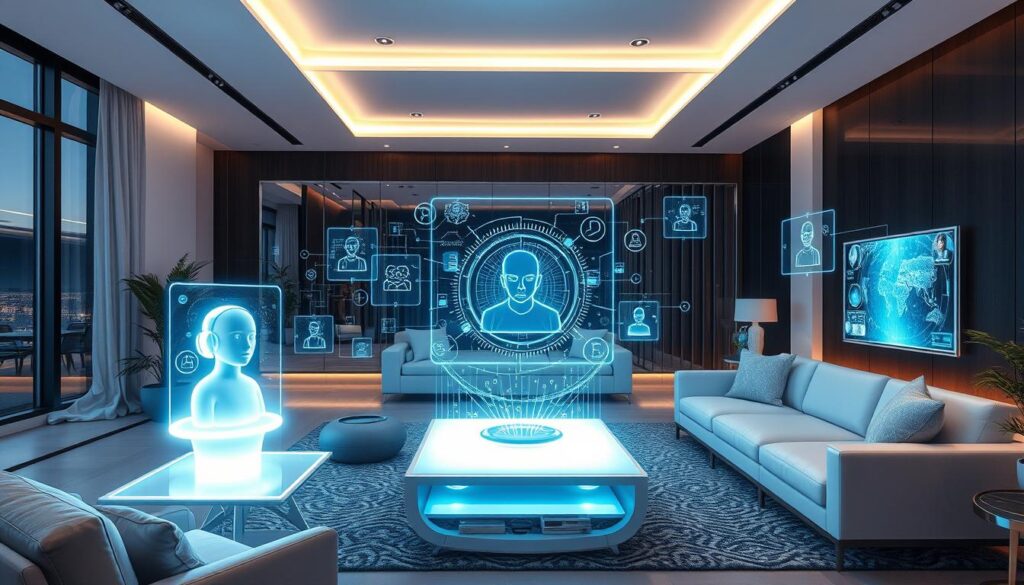Have you ever used Siri or Alexa to help with your daily tasks? These AI helpers are just the beginning. Soon, they could do even more for you. Imagine having a personal assistant that knows what you need before you ask.
They could control your smart home and even understand how you feel. This is the future of AI-powered personal assistants.
Evolution of AI-Powered Personal Assistants: From Basic Commands to Intelligent Conversations
The journey of AI-powered personal assistants has been amazing. It has changed how we use technology. Now, we can have smart talks with our digital friends, thanks to conversational AI.
Early Development Stages and Technological Milestones
The start of AI assistants was in the 1990s with voice recognition technology. These early systems could only do simple tasks. But, they laid the groundwork for better things to come.
As time went on, natural language processing and machine learning got better. This allowed assistants to understand and answer more complex questions.
Breakthrough Moments in Voice Recognition Technology
The big leap was when Siri and Alexa came out. They showed us how intelligent automation could change our lives. Now, we can control our digital world with just our voice.
Improvements in speech recognition and understanding have been key. They’ve made these assistants smarter and more helpful.
Read more : Are We Ready? Quantum Computing is Revolutionizing Technology
Current Capabilities and Limitations
Today, AI assistants can do a lot. They can remind us of things, control our homes, and even give us personalized advice. They can even have conversational AI chats with us.
But, they still can’t fully understand emotions or solve complex problems. They also need to get better at adapting to what each person likes. As tech keeps getting better, we’ll see even more amazing things from our digital friends.
“The evolution of AI-powered personal assistants is a testament to the rapid advancements in technology, transforming how we interact with the digital world around us.”
Natural Language Processing: The Core of Next-Generation Virtual Assistants
Looking ahead, AI-powered personal assistants will rely more on natural language processing (NLP). NLP makes communication between humans and machines more natural and intuitive. This is key for the next generation of smart virtual assistants.
At the heart of NLP are conversational AI and human-machine interaction. These technologies help virtual assistants understand natural language and engage in conversations. They can now talk like humans do, making interactions more natural.
NLP-powered virtual assistants can handle natural language queries well. They don’t need users to follow strict commands. This makes interactions smoother and more natural, as users can speak their minds and get accurate responses.
Also, NLP works with other AI tools like machine learning and contextual awareness. This lets virtual assistants learn and adapt to what each user likes. They offer personalized support and can even anticipate what you might need next.
As NLP keeps improving, we’ll see virtual assistants that can have deeper conversations. They’ll understand complex questions and provide more tailored help. This will make them even more valuable to users.
Understanding Human-Machine Interaction: Breaking Communication Barriers
AI-powered personal assistants are getting better at talking to us. They’re learning to understand us better. This is thanks to emotional intelligence, knowing the context, and being able to communicate in many ways.
Emotional Intelligence in AI Assistants
AI assistants are no longer just simple tools. They can now sense and respond to our feelings. This makes our interactions with them more empathetic and personal. They use special techniques to understand our emotions and give us the right answers.
Context Awareness and Situational Understanding
- AI assistants are getting better at knowing our surroundings and what we like.
- They can guess what we need and offer help that fits our situation.
- For example, they might suggest a nearby restaurant when we’re hungry or adjust the temperature when we’re coming home.
Multimodal Communication Features
AI assistants can now talk to us in many ways, not just voice. They can send text, show pictures, and even recognize gestures. This makes talking to them feel more natural and easy.
| Feature | Description | Benefit |
|---|---|---|
| Emotional Intelligence | AI assistants can detect and respond to user emotions | Fosters more empathetic and personalized interactions |
| Context Awareness | AI assistants can understand user environment and activities | Enables anticipation of user needs and proactive assistance |
| Multimodal Communication | AI assistants can communicate through voice, text, visuals, and gestures | Allows for more natural and intuitive interactions |
Thanks to these improvements, AI assistants are making our interactions smoother. They’re helping us talk to them in a way that feels natural and friendly.
AI-Powered Personal Assistants, Advancements in Digital Assistants
The world of AI-powered personal assistants is changing fast. It’s bringing us into a new era of smart technology. Users will soon enjoy a more personal and easy-to-use experience with these AI tools.
These tools can now understand and respond to our emotions. This makes our interactions with them feel more natural and empathetic. It’s a big step towards creating deeper connections with our digital friends.
AI assistants are also getting better at controlling our homes. They can manage things like lights, temperature, security, and entertainment with just our voice. This makes our homes smarter and more convenient.
As AI assistants get smarter, they’ll learn more about what we like and need. They’ll start to help us before we even ask. This will make our lives easier and more efficient.
The future of AI assistants looks very promising. They could change how we use technology and live our daily lives. We’re on the verge of a new era of smart, personal, and easy-to-use technology.

“The integration of emotional intelligence and contextual awareness in AI-powered personal assistants will revolutionize the way we interact with technology, fostering more natural and meaningful connections.”
Personalization and Predictive Analytics: Creating Tailored User Experiences
AI-powered personal assistants are getting better at giving users what they want. They use predictive analytics and anticipatory computing to learn what we like and need. This makes their help more personal than ever before.
Learning User Preferences and Behavior Patterns
These assistants use advanced machine learning to watch how we interact. They look at our search history, how we talk, and what devices we use. This helps them create detailed profiles of us.
With this info, they can make their responses and suggestions just for us. This makes their help feel natural and easy to use.
Anticipatory Computing and Proactive Assistance
The future of AI assistants is all about anticipatory computing. They use predictive analytics to guess what we need before we ask. This means they can suggest things we might like and even do tasks for us.
This makes our interactions with technology smoother and more helpful. It’s a big step towards making digital assistants that really get us.
| Feature | Benefit |
|---|---|
| Learning User Preferences | Tailored recommendations and responses |
| Predictive Analytics | Anticipatory and proactive assistance |
| Anticipatory Computing | Enhanced productivity and convenience |
Privacy and Security Concerns in Next-Generation AI Assistants
AI-powered personal assistants are getting smarter, but privacy and security worries are growing. People are worried about how their personal data might be used and the risks these smart systems face. It’s important to tackle these issues to build trust and make these AI assistants more popular.
One big privacy concern is how much personal data these virtual helpers collect and store. They gather everything from voice recordings and search history to location data and personal likes. It’s key to have strong data protection and clear privacy policies to ease these worries and keep users’ trust.
There’s also a need for security measures to stop unauthorized access and protect against cyber threats. As AI assistants become more part of our lives, the chance of hacking, data breaches, and misuse grows. Using strong encryption, two-factor authentication, and keeping software up to date can help protect user data.
“Protecting user privacy and security is not an option, but a necessity in the world of AI-powered personal assistants. Striking the right balance between innovation and responsible data management is crucial for the long-term success of these technologies.”
As AI assistants get better, it’s vital to keep focusing on privacy and security. Developers, policymakers, and privacy groups need to work together to set strong rules and standards. This way, we can unlock the full potential of these AI assistants while keeping users’ data safe.

| Privacy Concerns | Security Measures | Data Protection |
|---|---|---|
| Extensive data collection | Strong encryption | Transparent privacy policies |
| Storage of sensitive information | Two-factor authentication | Robust data protection protocols |
| Potential for misuse | Regular security updates | User control over data sharing |
Integration with Smart Home Ecosystems and IoT Devices
AI-powered personal assistants are getting better at working with smart homes and IoT devices. This makes our homes smarter and more connected. It changes how we live and automate tasks.
Seamless Device Communication
AI assistants and smart homes talk to each other easily. You can control things like the thermostat and lights with just your voice or a tap. This lets you manage your whole smart home ecosystems without hassle.
Enhanced Automation Capabilities
AI and IoT devices bring new levels of intelligent automation. You can set up routines for your home. Your AI assistant can then handle things like scheduling appliances and saving energy.
This tech is getting better. Soon, controlling your home will be even easier. It will make your life better and more comfortable.
Business Applications and Enterprise Integration
AI-powered personal assistants are changing the business world. They make work more efficient and effective. These virtual assistants are now used in companies, meeting their unique needs.
They help with tasks like paperwork and complex workflows. AI business applications are making companies work smarter. By adding these virtual assistants to their systems, companies can make better decisions and work together better.
The use of AI assistants goes beyond helping individuals. They are connected with important business tools like ERP and CRM. This connection gives companies quick access to data and helps them communicate better. It also automates tasks, making work more productive for everyone.




